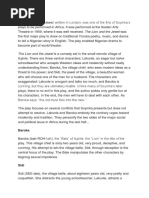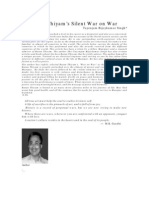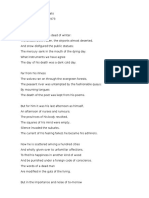Dario Fo
Uploaded by
Sagar S BallariDario Fo
Uploaded by
Sagar S BallariDario Fo's accidental Death of an Anarchist (1970) Responds to Events Unfolding in Italy in the Late 1960s and Early
1970s. Generally, It Looks At Police Corruption and Suspicions Regarding the Government's Collusion in This Corruption. More Specifically, It Addresses the Actual Death of an Anarchist Who Was Being Held in Police Custody Following the Bombing of a Milan Bank That Killed Sixteen People and Wounded About Ninety. the Police Asserted That the Anarchist's Death Was a Suicide, That the Man Threw Himself from a Fourth-Floor Window in Despair At Being Found Out for His Crime. At the Subsequent Inquest, the Presiding Judge Declared the Death Not a Suicide But an Accident. Most Italians Believed That the Death Was the Result of Overly Harsh Interrogation Techniques, If Not a Case of Outright Murder on the Part of the Interrogators. Accidental Death of an Anarchist is mainly about police corruption, underscored by the play's focus on impersonation, infiltration, and double-talk. A fast-talking major character, the Maniac, infiltrates a police headquarters. Posing as an investigating judge, he tricks the policemen into contradicting themselves and admitting that they are part of a cover-up involving the death of an anarchist. In infiltrating police headquarters by misrepresenting himself (impersonation), the Maniac reminds audiences of how most political groups in Italy, particularly left-wing groups, were infiltrated by police agents who acted as informers. The Maniac's flip-flop of point of view and statement achieves much the same effect as his impersonations do. His confusing speechifying leads to the police contradicting themselves, so that the Maniac, in all of his deceptions and distortions, is a precise reflection of what the play is designed to expose. Accidental Death of an Anarchist is one of Fo's most popular plays both within and outside Italy. It has played around the world over the years to millions of people, a popular choice of directors who want to point to corruption in their midst. Pluto Press (London) put out the first English version, translated by Gavin Richards. In 1992, Methuen published a fine set of volumes of Fo's plays, which included Accidental Death of an Anarchist.
Themes
Reform Versus Revolution Those who wish to change society may think that instituting reforms is the way to go about it. Reformers have faith in existing structures and believe that these structures need only be perfected or corrupt elements within them be rooted out for desired changes to come about. Others who wish to change society for the better believe that what is called for is revolution, a radical restructuring of society and its institutions. Revolutionaries tend to think that reforms are mere bandages on never-healing sores, leading to temporary alleviation of a persistent problem, such as poverty, but never eliminating it. They believe, in short, that existing structures must be dismantled and that entirely new ones must take their place. Fo's Accidental Death of an Anarchist is infused with revolutionary zeal, as is evident at the play's end, when the Maniac discourses on scandal. To the Maniac, scandals such as exposs of police corruption do little to bring about real change. Rather, scandal allows people to let off steam, with the result that the powers that be are in a stronger position than before. The implication is that scandal might lead to some reforms but never to true revolutionary change. In
the following excerpt, the Maniac pretends to be translating the words of a pope who knew very well how scandal could be used to strengthen his position: MANIAC: Did you know that when Saint Gregory was elected Pope, he discovered that his subordinates were up to all kinds of skullduggery in an attempt to cover up various outrageous scandals? He was furious, and it was then that he uttered his famous phrase: Nolimus aut velimus, omnibus gentibus, justitiam et veritatem. JOURNALIST: I'm sorry, your Eminence I failed Latin three times. MANIAC: It means: 'Whether they want it or not, I shall impose truth and justice. I shall do what I can to make sure that these scandals explode in the most public way possible; and you need not fear that, in among the rot, the power of government will be undermined. Let the scandal come, because on the basis of that scandal a more durable power of the state will be founded!' A bit later in the play, the Maniac speaks of scandal again: MANIAC: They've never tried to hush up these scandals. And they're right not to. That way, people can let off steam, get angry, shudder at the thought of it 'Who do these politicians think they are?' 'Scumbag generals!' 'Murderers!' And they get more and more angry, and then, burp! A little liberatory burp to relieve their social indigestion. Fear and Submission During periods of social unrest or general crisis, the political scene in a nation becomes tense. Different groups believe they have the answer to the nation's ills or a way to deal with the crisis and threat, and each group attempts to wrest control from those in power. The coalition in power naturally wishes to retain control and will often go to great lengths to do so. During the time period in which Fo wrote Accidental Death of an Anarchist, Italy was undergoing just such a period of extreme social unrest, when those in power wondered if they would be able to maintain authority and control. Particularly disturbing to the authorities was the growing influence of certain groups whose politics were "far" left, calling for a radical restructuring of society, not simply reform. In an effort to discredit such groups in the eyes of the general public, members of the Italian police force some say with the support of the government began sanctioning the activities of agents posing as far leftists and committing terrorist acts in their name. Bomb after bomb exploded in Italian cities, and the general public began to believe that order was escaping them. This fear on the part of the general public was precisely what was sought, as a fearful and uncertain public is a public unlikely to commit to major change at the governmental level for fear of yet more chaos. Fomenting chaos and encouraging fear are standard tactics of the corrupt and manipulative. Entirely dishonest, this is nevertheless a sure way to influence voters' behavior. At many points in the play, in which information is cited from actual documents, Fo's characters convey these various ideas. In the following excerpt, for example, the Maniac speaks of a plot to discredit "the Left":
MANIAC: At the start you served a useful function: something had to be done to stop all the strikes So they decided to start a witch-hunt against the Left. But now things have gone a bit too far. In the following excerpt, somewhat later in the play, Fo's fictional journalist cites actual facts concerning the makeup of the activist group to which the (real) anarchist belonged. Of the ten members of the group, four were infiltrators, as the Journalist points out: JOURNALIST: OK. So let's take a look behind that faade. What do we find? Out of the ten members of the [anarchist's] group, two of them were your own people, two informers, or rather, spies and provocateurs. One was a Rome fascist, well-known to everyone except the aforementioned pathetic group of anarchists, and the other was one of your own officers, disguised as an anarchist. The Journalist speaks again along similar lines still later in the play: JOURNALIST: (Taking some papers from a folder) And I suppose nobody's told you either that out of a total of 173 bomb attacks that have happened in the past year and a bit, at a rate of twelve a month, one every three days out of 173 attacks, as I was saying (She reads from a report) at least 102 have been proved to have been organised by fascist [rightist] organisations, aided or abetted by the police, with the explicit intention of putting the blame on Left-wing political groups.
You might also like
- Hourglass Workout Program by Luisagiuliet 276% (21)Hourglass Workout Program by Luisagiuliet 251 pages
- Read People Like A Book by Patrick King-Edited57% (82)Read People Like A Book by Patrick King-Edited12 pages
- Livingood, Blake - Livingood Daily Your 21-Day Guide To Experience Real Health77% (13)Livingood, Blake - Livingood Daily Your 21-Day Guide To Experience Real Health260 pages
- Donald Trump & Jeffrey Epstein Rape Lawsuit and Affidavits83% (1016)Donald Trump & Jeffrey Epstein Rape Lawsuit and Affidavits13 pages
- The 36 Questions That Lead To Love - The New York Times94% (34)The 36 Questions That Lead To Love - The New York Times3 pages
- The 36 Questions That Lead To Love - The New York Times95% (21)The 36 Questions That Lead To Love - The New York Times3 pages
- Jeffrey Epstein39s Little Black Book Unredacted PDF75% (12)Jeffrey Epstein39s Little Black Book Unredacted PDF95 pages
- 14 Easiest & Hardest Muscles To Build (Ranked With Solutions)100% (8)14 Easiest & Hardest Muscles To Build (Ranked With Solutions)27 pages
- The 4 Hour Workweek, Expanded and Updated by Timothy Ferriss - Excerpt23% (954)The 4 Hour Workweek, Expanded and Updated by Timothy Ferriss - Excerpt38 pages
- Study Material On Six Characters in Search of An Author by Luigi PirandelloNo ratings yetStudy Material On Six Characters in Search of An Author by Luigi Pirandello10 pages
- Manifestation With Motion To Allow Accused To Plead Guilty To Lesser Offense100% (1)Manifestation With Motion To Allow Accused To Plead Guilty To Lesser Offense2 pages
- Post Modern Indian Theatre - Ratan Thiyam's Silent War On WarNo ratings yetPost Modern Indian Theatre - Ratan Thiyam's Silent War On War9 pages
- General Introduction: 1.1 Miller and Modern American DramaNo ratings yetGeneral Introduction: 1.1 Miller and Modern American Drama37 pages
- New Historicism Applied On "DR - Faustus by Christopher MarloweNo ratings yetNew Historicism Applied On "DR - Faustus by Christopher Marlowe12 pages
- An Analysis of The Characters in Jean Genet's "The BalconyNo ratings yetAn Analysis of The Characters in Jean Genet's "The Balcony5 pages
- Who's Afraid of Virginia Woolf Desperate Housewives PDFNo ratings yetWho's Afraid of Virginia Woolf Desperate Housewives PDF10 pages
- Take Home Quiz: Twilight Zone, All in Its Monochrome Glory (Not To Mention The Color of The Characters ClothesNo ratings yetTake Home Quiz: Twilight Zone, All in Its Monochrome Glory (Not To Mention The Color of The Characters Clothes4 pages
- Samskara Is Set in Durvasapura, An Agrahara, A Closed-Off Brahmin CommunityNo ratings yetSamskara Is Set in Durvasapura, An Agrahara, A Closed-Off Brahmin Community2 pages
- Walter Pater Conclusion To Studies in The RenaissanceNo ratings yetWalter Pater Conclusion To Studies in The Renaissance2 pages
- Gandhi Myth in Kanthapura: Co-Mingling of Fact and FictionNo ratings yetGandhi Myth in Kanthapura: Co-Mingling of Fact and Fiction3 pages
- Portrait of The Artist As A Young Man SummaryNo ratings yetPortrait of The Artist As A Young Man Summary1 page
- Evolution Theory African Dramatic LiteraNo ratings yetEvolution Theory African Dramatic Litera15 pages
- Bertolt Brecht Was A Dramatist Who Changed Meanings of TragedyNo ratings yetBertolt Brecht Was A Dramatist Who Changed Meanings of Tragedy5 pages
- William Shakespeare's Life and His AchievementsNo ratings yetWilliam Shakespeare's Life and His Achievements2 pages
- Dramatic Monologue Filippo Lippi Church Blank Verse Iambic PentameterNo ratings yetDramatic Monologue Filippo Lippi Church Blank Verse Iambic Pentameter2 pages
- To Be or Not To Be That Is The Question PDF100% (1)To Be or Not To Be That Is The Question PDF4 pages
- THE PROTAGONIST OF LIFE OF GALILEO by Shreeya MalhotraNo ratings yetTHE PROTAGONIST OF LIFE OF GALILEO by Shreeya Malhotra2 pages
- Judgment For Mr. Henry Femi Osobu v. Mrs. Aniekeme Adewa FaboroNo ratings yetJudgment For Mr. Henry Femi Osobu v. Mrs. Aniekeme Adewa Faboro10 pages
- 2017-10-01 Zernik v State of Israel et al (7631/17) – criminal appeal – in the Supreme Court – Notice of Appeal and Appeal // צרניק נ מדינת ישראל ואח' (7631/17) – ערעור פלילי – בבית המשפט העליון – הודעת ערעור וערעורNo ratings yet2017-10-01 Zernik v State of Israel et al (7631/17) – criminal appeal – in the Supreme Court – Notice of Appeal and Appeal // צרניק נ מדינת ישראל ואח' (7631/17) – ערעור פלילי – בבית המשפט העליון – הודעת ערעור וערעור177 pages
- Non-Joinder of Indispensable Parties Is Not A Ground For The Dismissal of An ActionNo ratings yetNon-Joinder of Indispensable Parties Is Not A Ground For The Dismissal of An Action2 pages
- Complaint Filed Against Sacramento County and Sacramento Co. Sheriff Deputy LindeNo ratings yetComplaint Filed Against Sacramento County and Sacramento Co. Sheriff Deputy Linde11 pages
- Magellan Marketing Mfg. Corp. v. Court of Appeals G.R. No. 95529 August 22, 1991No ratings yetMagellan Marketing Mfg. Corp. v. Court of Appeals G.R. No. 95529 August 22, 19912 pages
- Chungu V People (SCZ Judgment 18 of 2009) 2009 ZMSC 175 (16 July 2009)No ratings yetChungu V People (SCZ Judgment 18 of 2009) 2009 ZMSC 175 (16 July 2009)4 pages
- Jalalon, Jeanine Vanessa R. CONSUMER PROTECTION LAW - First AssignmentNo ratings yetJalalon, Jeanine Vanessa R. CONSUMER PROTECTION LAW - First Assignment2 pages
- 22 Ministerio vs. The Court of First Instance of CebuNo ratings yet22 Ministerio vs. The Court of First Instance of Cebu1 page
- Law of Criminal Revisions: S.S. UpadhyayNo ratings yetLaw of Criminal Revisions: S.S. Upadhyay60 pages
- Bar Council of India v. High Court of Kerala, AIR 2004 SC 2227100% (2)Bar Council of India v. High Court of Kerala, AIR 2004 SC 222712 pages























































































































